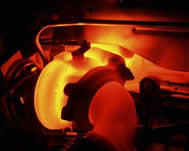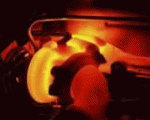
Everything posted by KATOOM
-
Dealership Coolant vs Aftermarket Coolant
I've noticed that the antifreeze you get at the dealer or Cummins locations is Propylene Glycol because its less toxic. But what you want is Ethylene Glycol because it does a better job dissipating heat. The regular old green stuff at the parts stores is EG. There are PG antifreezes too but they're usually specific. Get a couple gallons of green concentrate and a few gallons of distilled water and the whole thing will run you about $30. Get the 50/50 stuff and you'll spend twice that.
-
Intake horn info
Think of it this way..... Just remember that the air traveling through the horn dumps (literally) downward into the front 1/3 side of a long flat intake manifold. After that incoming air slams off a flat surface entering the intake plenum, it has to flow all the way back to the far cylinders. Again.....an attractive looking sweeping arch aftermarket horn isnt going to do anything worth noticing if you're not on a dyno measuring the smallest of gains. As mentioned before, freeing up the exhaust will generally offer some noticeable gains so maybe spend your money on a new exhaust manifold. Even at that, most people will say that did nothing either.
-
Cummins Injector Testing
Good video.
-
Can anyone solve my mystery clunk
I'm not sure there's anything left to question, and the only things which haven't been checked is the body mounts.
-
Can anyone solve my mystery clunk
I'm sure you're right. But just to be sure, I think you should drop your truck off with me for a week or so. That way I can drive it around and determine what the noise is. You know.....for the betterment of the forum.
-
Can anyone solve my mystery clunk
So then I'm going to assume that the clunk noise is constant as you drive around and not just every once in awhile on certain bumps.....
-
Can anyone solve my mystery clunk
It is a "larger" clunk from a component with a lot of mass or weight behind it, or is it a "smaller" clunk that sounds like something lightweight tapping? Meaning, like someone is under there with a 10 lb sledge or with a big screwdriver? And is the noise audible enough and often enough that your can video the clunk?
-
Can anyone solve my mystery clunk
I would agree to that..... I regards to the clunk, Me have you checked the front driveshaft?
-
How Noisy is Your Engine at Idle?
https://mopar1973man.com/topic/11986-can-anyone-solve-my-mystery-clunk/#comment-144736
-
Can anyone solve my mystery clunk
Mmmmm.....not sure I agree with that. Because not only will the bottom track bar joint unknowingly slop around if its not tight enough, even though its thought to be properly tightened. And all joint fittings besides the poly joints will bang and clank in very little time of use. Heim fittings are notorious for this quick wear slop too and even Johnny Joints will loose their ability to remain quiet if they're not greased right and tightened occasionally. So yes, track bar can still be an issue.
-
Can anyone solve my mystery clunk
What track bar?
-
Can anyone solve my mystery clunk
Under what conditions are needed to make the clunk? Small bumps, road dips, curbs, pot holes, etc... Is there any relation to weather or driving conditions? Towing or not? Does it sound metallic or soft and heavy? Can you audibly hear it or only feel it? Do you feel it in the steering wheel, under your but, or under your feet. What track bar do you have and what joints does it have? Lets get all CSI on this bugger.....
-
Intake horn info
Forced induction engines tend to not benefit from intake modifications as everything is essentially being "shoved" in by the turbo or supercharger. They do though respond to exhaust side work as the easier exhaust gets out the faster intake can get in without clogging up and increasing drive pressure. I know that was crude laymans terms but you get the idea. Nonetheless, people generally see no gains with aftermarket intake horns.
-
How Noisy is Your Engine at Idle?
I'd be interesting in knowing more about this mystery clunk if you'd care to talk more about it. But I dont want to clog up this thread either, so either PM me or start a new topic?
-
How Noisy is Your Engine at Idle?
Mystery noise?
-
How Noisy is Your Engine at Idle?
Usually yelling doesn't even work. I've actually become pretty good at lip reading for such occasions.....and it doesn't hurt to know a little sign language either. Totally agree..... I've read so many threads where people are disassembling their truck and installing sound muffling material in order to have simply conversations or listen to the radio while driving. Strange because my truck is actually pretty quiet inside the cab while driving. Again, I db tested this and it was about the same as my old minivan. But.....when I hook up to something heavy then the Cummins becomes a beastly noise maker. But thats OK because I dont listen to music or talk much while towing heavy because I'm too busy paying attention to the road.
-
How Noisy is Your Engine at Idle?
Your video sounds like a typical noisy 2nd gen ISB. Yes, I've checked mine with a db reader a couple years ago and it was approximately 92 db standing back about 5 feet pointed at the radiator with the hood closed. This truck is so loud that when its idling in the garage its hard to think unless you're in the cab. And as Moparman and Me78569 pointed out, the ambient weather, different fuel, and engine operating temperatures can have an affect on overall engine noise. Sounds like you just haven't been driving your truck enough and forgot what its like.....
-
Goose neck adapter
Just in case some members dont already know, you cant allow passengers to ride in a 5th wheel that isnt connected to the tow vehicle by a 5th wheel secure locking hitch. A ball hitch doesn't qualify as that either. So if you ever do travel with anyone riding in the 5th wheel trailer then you cant use the linked hitches. This is not meant to create a discussion of who does or why someone doesn't, or any other reason other than giving everyone a heads up.
-
Anyone try "Dip your car"?
Someone showed me this website and I have to say it looks pretty cool. You could change the color of your car/truck whenever you felt like it. Pretty inexpensive too. I might give it a try. https://www.dipyourcar.com/
-
Which fuel pump should I get?
You want your fuel pressure gauge to be after the fuel filter so that you know when your fuel filter is plugged up. If you want to connect the sensor back on the FASS then thats perfectly OK, you'll just need more wire. And yes, you'll still want a snubber.....
-
Prayers Please for MoparMom
Get well soon.....
-
High fuel pressure. AirDog whining.
Yes, different topic. I'll look for that thread.
-
High fuel pressure. AirDog whining.
DONT adjust that valve.....! Not sure why anyone thought this was a good idea to market. Matter of fact, I'd suggest throwing it away and replacing with a factory Bosch overflow valve thats NOT adjustable.
-
Which fuel pump should I get?
If you have enough of the hose left then all you need is the JIC fittings and adapters. I linked what you're looking for but where you get them is up to you. The 90* tapped elbow for the outlet of the fuel filter housing. Needle valve to act as a snubber. or Dedicated snubber or another dedicated snubber The pushloc fitting for the hose end that goes to the VP. The 12x1.5 mm to -8 JIC adapter for the inlet of the VP and the oulet of the fuel filter housing. (You need two of them) And I'm not buying that Edge never heard of the VP pulses. Its kind of a well understood industry thing..... So to say they know nothing of it sounds like the tech was clueless or they're moving away from admitting the knowledge of the problem for sake of warranty issues. Either way, you HAVE to use a snubber on these trucks. Lastly, if you have plans of connecting the sensor directly to the 90* tapped elbow then you may want a 1/8" NPT - 1/8" NPT 90* elbow so you have room.
-
Which fuel pump should I get?
You can leave the factory supply line in its place if it doesn't bother you. But you should get some rubber caps so they dont end up full of garbage if you should ever want to use them again. You can also leave the lift pump in place too if its not in your way, but removing it is easy. The line from the fuel filter to the VP should also be changed to 1/2" as there's no point in going through all that effort just to keep a small section of tiny fuel line and restrictive banjo bolts. Counter productive..... You need to move that sensor away from the VP too. A lot of hydrodynamic fluid pulses coming from the VP and can damage the sensor over time. Hopefully you have a snubber on it though otherwise sensor damage will be inevitable. On a good note though, when you replace the fuel line between the filter and VP, you can use a tapped 90* barb at the outlet fitting of the filter housing which will allow a new location to place the gauge sensor.



